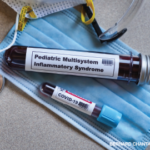He also stated that we do not yet have the longitudinal data to see what happens to these autoantibodies in patients over time. It remains to be seen if the formation of new-onset IgG autoantibodies in moderate to severe COVID-19 has implications for future development of immunodeficiency phenotypes or autoimmune disease in these patients.
MIS-C
The next talk was given by Kate Webb, MD, PhD, pediatric immunology clinician scientist at the University of Cape Town, South Africa, on the topic of SARS-CoV-2 antibody phenotype and immune gene expression in MIS-C. Dr. Webb explained that, to date, it has been unclear why some children with SARS-CoV-2 infection develop MIS-C while others do not. The aims of the study conducted by Dr. Webb and colleagues were to compare a cohort of children with evidence of exposure to SARS-CoV-2 and see which patients develop MIS-C, to look for differences in SARS-CoV-2 antibodies and to evaluate differences in immune gene expression among these patients.
Researchers enrolled 33 children with MIS-C (mean age 6.9 years) and compared these individuals to 97 healthy children (30% of whom had been exposed to SARS-CoV-2 and 60% who were unexposed). From studying these children, Dr. Webb and her colleagues noted that SARS-CoV-2 antibody titers were no different in MIS-C compared to healthy exposed children and that spike antibody (IgG) titer does not change over time in patients with MIS-C. Dr. Webb and her colleagues also found that patients with MIS-C showed a distinct expression of immune genes as compared to healthy children, with a dynamic return of gene expression to normal when followed over time.
TNFi or Rituximab Treatments
In the penultimate talk, Luisa M. Rojas Vargas, MD, Rheumatology Service of Hospital La Mancha Centro, Alcazar de San Juan, Spain, discussed a study assessing whether tumor necrosis factor inhibition (TNFi) or rituximab is related to a different course and severity of SARS-CoV-2 infection in patients with rheumatic diseases as compared to patients receiving other biologic therapies.
In this observational, retrospective, multicenter study, Dr. Vargas and colleagues enrolled 372 patients with rheumatic diseases who had received TNFi or rituximab from at least three months prior to the beginning of the COVID-19 pandemic until March 2021. Of these patients, 18% had confirmed SARS-CoV-2 infection, with 40% of these patients having a history of spondyloarthritis, 32% with rheumatoid arthritis and 12% with psoriatic arthritis.




